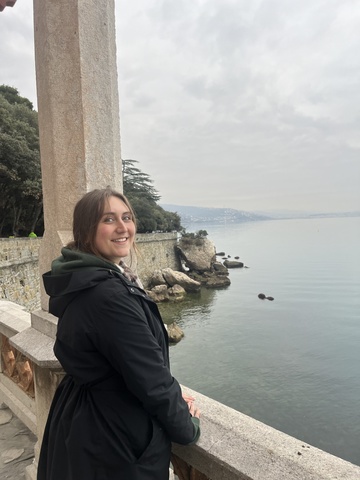Prospective study abroad students who are enrolled or are considering enrolling in a study abroad program joined the University of Iowa International Programs office as it concluded its Study Abroad Conversation Series with the session, “Mindful Travel,” on Monday, March 31, 2025. Phoebe Nishimoto, UI study abroad advisor and program coordinator, presented some of the important realities of going abroad, exploring cultural differences and practicing mindfulness while traveling abroad.
“Almost everyone in our office has had extensive travel experience, and we love that we get to share that with students,” Nishimoto said. “But it's also important to think about what that means and what positive or negative impact traveling somewhere can have.”
In this session, Nishimoto highlighted why it’s important for students to not only consider the impact studying abroad may have on them, but the impact students have on the places they live and travel abroad — and how to make that impact a positive one.

The panel included three UI students who are also Study Abroad peer mentors, and have previously studied abroad:
- Sophia Caronis, studied on the IES London: Study London in the United Kingdom program
- Nora Engstrom, studied on the Lancaster University Exchange in the United Kingdom program
- Maddie Phillips, studied on the IES Internships London program
Here are four ways students can be mindful of their travel experiences abroad based on the discussion:
Sustainability
How do we balance the negative impacts of travel with the positive impacts it may have on our personal lives? How does a student’s time abroad affect their host community? Nishimoto shared with students the impact they might have on over-tourism and offered tips to travel more sustainably.
“Sometimes, students will travel every single weekend while they're abroad, especially if they’re in Western Europe where they have access to so many places,” Nishimoto said. “But, sometimes it’s good to consider staying local, even if it’s just for two weekends during your time abroad.”
Along with staying local in your host community, utilize local businesses and transportation to positively impact sustainability while abroad.
“The U.S. isn’t great in terms of buses, but other parts of the world are, so utilize those local resources,” Nishimoto shared. “Instead of staying at a Hilton, consider using local hotels and guesthouses.”
Storytelling
In the digital era students currently live in, Nishimoto encouraged students to think about what they’re sharing online and how to use their voice when talking about their experience.
- Positionality and Voice: Who are you representing? Are you speaking for another country or about your own experience?
- Social media: Ask yourself if what you’re posting could be harmful or misrepresent a place, culture, or people abroad.
- The Glasses Analogy: Nishimoto introduced this analogy for students to understand that what they perceive abroad may be different from how others view it.
"So, a guy with blue glasses visits another country, and he returns home and tells others, ‘They all wear green glasses there,’” Nishimoto explained. “But really, they wear yellow glasses; his perception was shaped by his own lens. It’s important to understand that our perspective isn’t always accurate or necessarily the truth."
Tourism
Nishimoto encouraged students to figure out why they want to go to a particular location by doing research beforehand.
“When you’re booking travel somewhere, simply asking ‘who, what, when, where, and why’ can be helpful because it can narrow down your options and help you be more mindful of your choices,” Nishimoto suggested.

Intercultural Competence
It can be frustrating to adjust to a lot of newness at once, such as adjusting to a language barrier or different customs. Nishimoto uses Deardorff's Model to demonstrate this.
“It's a cycle, meaning that you’re never fully interculturally competent—you're continuously learning,” Nishimoto explained. “Continue being curious about another culture.”
Student-to-Student Advice
The three student panelists provided insights into their personal experiences and what they learned during their study abroad programs.
“When I was traveling, I talked to a lot of people from different places,” Phillips said. “My friends would remind me to be aware of my surroundings because it’s a safety thing, too.”
Engstrom added that students should prepare for an adjustment period when studying abroad.
“Sometimes you’ll get frustrated in the heat of the moment abroad and everything is unfamiliar,” Engstrom said. “But, for me, coming back was a lot harder than going there. Preparing for uncertainty when you go abroad can help you better prepare for when you come back.”
Caronis encouraged students to do research before going abroad and even learn some of the language.
“Learning little phrases can go a long way,” Caronis said. “Just know that you’re not going to know everything. Just do the best you can and be open and willing to learn.”
The Study Abroad Conversation Series is dedicated to amplifying the voices of UI study abroad students, and covers essential topics like funding study abroad, leveraging international experiences for career growth, gaining global skills and traveling mindfully. The series will continue in the 2025-2026 academic year, and future sessions will be posted on the series website at a later date.
International Programs (IP) at the University of Iowa (UI) is committed to enriching the global experience of UI students, faculty, staff, and the general public by leading efforts to promote internationally oriented teaching, research, creative work, and community engagement. IP provides support for international students and scholars, administers scholarships and assistance for students who study, intern, or do research abroad, and provides funding opportunities and grant-writing assistance for faculty engaged in international research. IP shares their stories through various media, and by hosting multiple public engagement activities each year.
